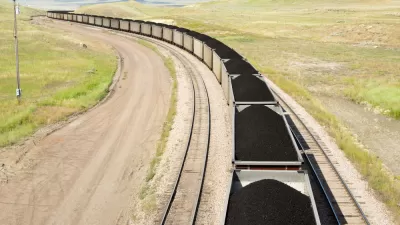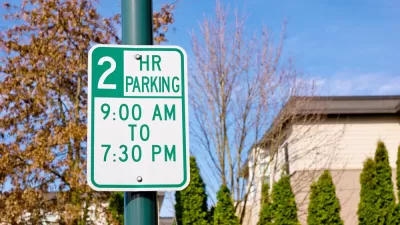It was viewed as a "David vs. Goliath" pipeline fight: the city of South Portland, Maine against a pipeline company backed by Big Oil. The city had passed a zoning ordinance preventing the export of oil which would have impacted public health.
"A federal judge has ruled [pdf] that the coastal city of South Portland, Maine, did not violate the [Commerce Clause of the] U.S. Constitution when it passed an ordinance that blocked a local pipeline company from bringing tar sands oil through its port," reports Sabrina Shankman for InsideClimate News.
For the city of 25,000, the [Aug. 24] ruling was a surprise victory after years of fighting what felt like an impossible battle against some of the world's biggest oil companies, which lined up to support the Portland Pipe Line Corporation (PPLC).
Provided the [U.S. District Court of Maine] ruling survives an appeal, it slams the door on a significant plan to ship Canadian tar sands oil, one of the most carbon-intensive fuels on the planet, to the East Coast for export to international markets, and it could offer a guide for other communities hoping to block energy projects.
The pipeline proposal is unconventional: Convert an existing "236-mile underground pipeline that has carried foreign crude from harbor terminals in South Portland to refineries in Montreal since World War II," according to Joe Lawlor of the Portland Press Herald, to carry tar sands crude originating from Alberta and reverse the direction (see map). However, tar sands crude, unlike the current crude flowing through the pipeline, is also unconventional, meaning it needs additional processing before it can be exported. Shankman explains:
The plan called for the construction of a pair of 70-foot-high smokestacks next to a beloved waterfront park to burn off volatile compounds from the tar sands oil before it could be loaded into tankers. Concerns about emissions from those smokestacks led to the creation of the so-called Clear Skies Ordinance which banned the bulk loading of crude oil onto tankers. [See Planetizen: Tar Sands Rebellion in Maine Port City, July 25, 2014. Listen to NPR report (source article].
The pipeline company filed its lawsuit in 2015, and a lengthy, expensive legal battle ensued. Late last year, a federal district court judge threw out all but one of the industry's claims against the city, but left open the key question of whether the ordinance violated the Constitution [which was decided Aug. 24 to the favor of South Portland].
The decision "gives communities a powerful tool," said Ken Rumelt, a Vermont Law School professor who led students at its environmental law clinic in advising groups involved in the case. "It says that a community, assuming there is no state law preempting what they're trying to do, can say no, we don't want to suffer these impacts."
"This is one of the first times that a federal court has ruled that cities and towns can prohibit crude oil pipeline and loading facilities through local zoning without being preempted by any federal statute or violating federalism principles in the Constitution," according to Foley Hoag LLP, the Boston firm that represented South Portland.
Lawlor of the Press Herald reports that Portland Pipeline is considering an appeal, which would go to the 1st U.S. Circuit Appeals Court in Boston.
Update on Canadian tar sands crude pipeline projects
"One by one, viable options to export the tar sands via pipeline have run into challenges," adds Shankman.
TransCanada abandoned its plans for the Energy East Pipeline in 2017, announcing it was uneconomical. Earlier this month, a federal judge ordered a new environmental review of the Keystone XL project. And later this week, a Canadian court will rule on whether First Nations groups were adequately consulted in the plans for the Trans Mountain pipeline—a decision that could delay or cancel the plans for that pipeline.
Related recent energy export post
-
Federal Judge Strikes Down Oakland's Ban on Coal Exports, May 18, 2018Shipping coal from Utah to export to Asia through a new cargo facility in Oakland, California took a significant step forward on May 15 with a strongly worded ruling condemning the adequacy of the city of Oakland's environmental analysis.
FULL STORY: South Portland’s Tar Sands Ban Upheld in a 'David vs. Goliath' Pipeline Battle

Planetizen Federal Action Tracker
A weekly monitor of how Trump’s orders and actions are impacting planners and planning in America.

Maui's Vacation Rental Debate Turns Ugly
Verbal attacks, misinformation campaigns and fistfights plague a high-stakes debate to convert thousands of vacation rentals into long-term housing.

San Francisco Suspends Traffic Calming Amidst Record Deaths
Citing “a challenging fiscal landscape,” the city will cease the program on the heels of 42 traffic deaths, including 24 pedestrians.

Amtrak Rolls Out New Orleans to Alabama “Mardi Gras” Train
The new service will operate morning and evening departures between Mobile and New Orleans.

The Subversive Car-Free Guide to Trump's Great American Road Trip
Car-free ways to access Chicagoland’s best tourist attractions.

San Antonio and Austin are Fusing Into one Massive Megaregion
The region spanning the two central Texas cities is growing fast, posing challenges for local infrastructure and water supplies.
Urban Design for Planners 1: Software Tools
This six-course series explores essential urban design concepts using open source software and equips planners with the tools they need to participate fully in the urban design process.
Planning for Universal Design
Learn the tools for implementing Universal Design in planning regulations.
Heyer Gruel & Associates PA
JM Goldson LLC
Custer County Colorado
City of Camden Redevelopment Agency
City of Astoria
Transportation Research & Education Center (TREC) at Portland State University
Jefferson Parish Government
Camden Redevelopment Agency
City of Claremont




























